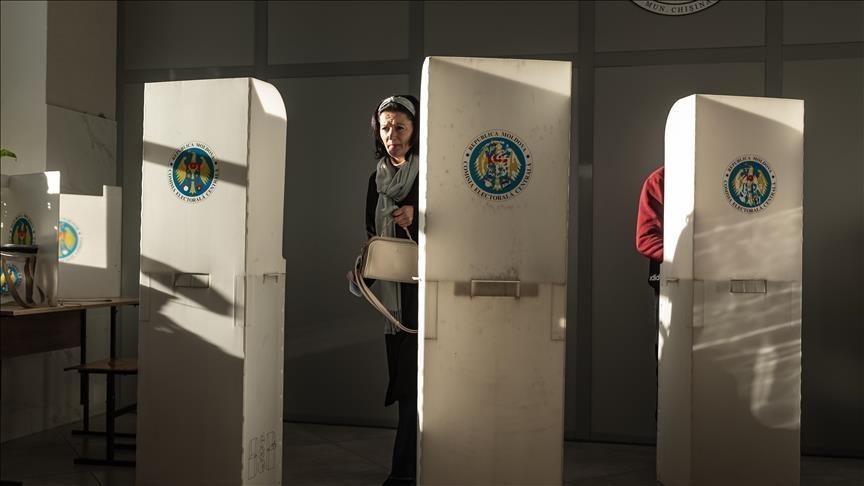EXPLAINER – What to know for Moldova’s ‘most consequential’ election
Moldovans will vote on Sunday to decide the balance of power in 101-seat legislature and whether the country moves toward the EU or Russia

- Pro-European forces led by President Maia Sandu are taking on opposition alliances favoring Moscow amid allegations of external interference
- Opinion polls indicate a tight race and a possibility of Sandu’s ruling party losing its majority
ISTANBUL
Moldova heads to the polls on Sunday in what President Maia Sandu has called the “most consequential” election since the country gained independence from the Soviet Union 34 years ago.
— Anadolu English (@anadoluagency) September 26, 2025
The vote will not only decide the balance of power in Parliament but also shape the country’s bid for EU membership, as pro-European forces led by Sandu take on opposition alliances leaning toward Moscow.
Analysts say the outcome could either consolidate Moldova’s move toward Europe or pull it back into Russia’s orbit.
Sandu’s pro-European Party of Action and Solidarity (PAS), which swept to a majority in the 2021 elections, is now fighting to retain control of the 101-seat Parliament.
PAS has led Moldova closer to Brussels, securing EU candidate status alongside Ukraine in 2022 and opening accession talks in 2024. Last year, a referendum narrowly enshrined EU membership in the constitution.
Yet polls suggest PAS may struggle to maintain its majority. It faces stiff competition from opposition alliances including the Patriotic bloc, led by former President Igor Dodon, and the Alternative bloc, which counts Chisinau Mayor Ion Ceban and former presidential candidate Alexandr Stoianoglo among its leaders.
Both groupings have tried to frame themselves as viable alternatives to PAS.
The Victory bloc, led by businessman Ilan Shor – convicted of fraud and money laundering, and living in Russia – was barred from running by the Central Election Commission, though Sandu’s opponents accuse her of manipulating the rules to weaken challengers.
EU ambitions vs. Russian influence
Moldova’s EU push has repeatedly collided with allegations of Russian interference. During last year’s presidential election and EU referendum, Sandu accused “criminal groups” backed by “foreign forces” of trying to buy hundreds of thousands of votes to tilt the outcome.
Moscow dismissed the charges as unfounded.
Now, with another pivotal election looming, Sandu has doubled down, warning in July that Russia is “investing in multiple political vehicles” to gain influence in Parliament.
The Kremlin has denied the claims, countering that it is Moldovan authorities who are “dividing citizens” by limiting polling stations in Russia while expanding them across Europe.
Russia has also accused the EU and NATO of plotting to “occupy Moldova” and intimidate Transnistria, the breakaway region controlled by pro-Russian separatists since the early 1990s.
Transnistria is located on a narrow strip of land between the Dniester River and Moldova’s eastern border with Ukraine’s Odesa. It is internationally recognized as part of Moldova, but since a brief war in 1992, has functioned as a de facto independent state with its own government, military, currency, and passport system.
Transnistria’s strategic location and the presence of a large, aging Soviet-era weapons depot make it a potential flashpoint, especially in the context of the war in Ukraine.
Around 277,000 registered voters in the region also add another complicating factor to the election.
High stakes and rising tensions
The election campaign has already exposed Moldova’s political fractures. Earlier this week, police detained 74 people accused of participating in alleged Russian-backed efforts to sow unrest, prompting furious denials from the opposition.
“The criminal PAS regime is trying to intimidate us, to scare the world, to silence us,” Dodon said in a statement on Telegram.
Such tensions highlight the razor-thin margin in Sunday’s vote.
Opinion polls indicate a tight race between PAS and the Patriotic bloc, raising the possibility that Sandu’s party could lose its majority, forcing her to seek coalition partners or risk political gridlock at a time of extraordinary external pressure.
Whatever the result, the election will determine Moldova’s political future, as Sandu told the European Parliament earlier this month: “Its outcome will decide whether we consolidate as a stable democracy on the path to EU membership … or whether Russia destabilizes us, pulls us away from Europe, and turns us into a threat on Ukraine’s southwestern border and Europe’s eastern frontier.”
Anadolu Agency website contains only a portion of the news stories offered to subscribers in the AA News Broadcasting System (HAS), and in summarized form. Please contact us for subscription options.







